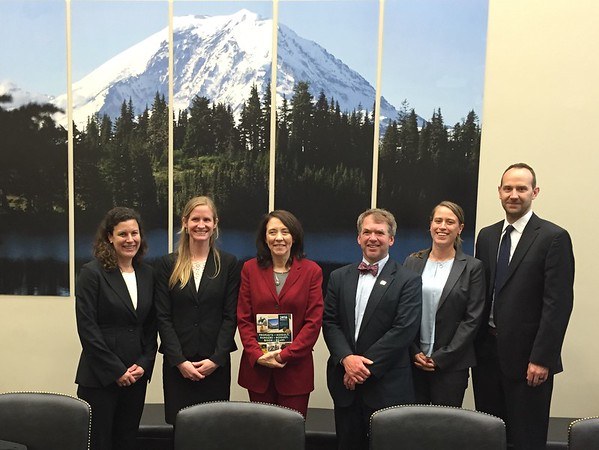
You don’t have to be a skilled lobbyist or an expert advocate to make a difference for the lands you love. As someone who cares deeply about the outdoors, you’re well positioned to be an effective advocate - it just takes a little time and training. That’s where our recently-launched Advocacy 101 eLearning course comes in. Through Advocacy 101, you’ll learn the basics of advocacy and best practices for advocating for important conservation and recreation initiatives by engaging with lawmakers and land managers.
Taking an advocacy action like writing to your members of Congress only takes a few minutes and can make a difference advancing policies that move conservation and recreation forward. Understanding why it’s important to engage with lawmakers and how to do so effectively will enable you to have a greater impact for the outdoor places and experiences you love.
Why Engage with Lawmakers?
Who are we referring to with the term “lawmaker”? Lawmakers are decision-makers elected to serve in the legislative branch of a local, state, or national government. These elected officials serve constituents by legislating, or passing laws and funding government services and programs. Lawmakers are one of the key targets of our outdoor advocacy because they’re well positioned to champion initiatives that conserve public lands and enhance sustainable outdoor recreation management and access.
Lawmakers at all levels of government generally have a desire to invest in their communities and enrich the lives of their constituents. Because of these desires and a strong passion for their work, lawmakers can be moved to champion and shape policy when they care about an issue or are shown how an issue impacts their state or district and the lives of their constituents.
For instance, surveys have shown that congressional staff overwhelmingly believe that constituent engagement through meetings, events, and letters has a strong ability to influence a lawmaker, especially when they’re undecided on an issue. What’s more, public lands and outdoor recreation have proven to be bi-partisan issues at the federal level and in many state legislatures across the country.
Here’s where you come in: It’s important for your elected officials to hear from you on the public lands and outdoor recreation issues you care about, and engaging your lawmakers is one of the best ways to launch your outdoor advocacy journey. With about 60 percent of Mountaineers programs occurring on federal lands, we prioritize congressional advocacy, but many of the ways to engage, and best practices for doing so, are applicable to state and local lawmakers as well.
Best Practices for Lawmaker Engagement
In Advocacy 101, we unpack best practices for five introductory ways you can engage with lawmakers. These actions don’t have to take lots of time, and you don’t need to do all of them right away. Here is a preview of what we cover about lawmaker engagement in our Advocacy 101 course.
- Contacting lawmakers through letters and calls
- Engaging lawmakers on social media
- Attending a Town Hall or other event
- Writing and submitting a Letter to the Editor (LTE)
- Participating in an organized lobby day or meeting
Taking these actions to engage with lawmakers will help build a relationship with that lawmaker and their staff, which will come in handy when key opportunities arise to prioritize and support public lands and outdoor recreation. This type of advocacy can be a long game, so don’t be discouraged if your advocacy doesn't yield immediate results.
Lawmakers place extra value on communication received from their direct constituents. Every contact to a lawmaker is tracked by their staff, and the knowledge garnered from those communications is analyzed and used to make decisions about which issues to prioritize and invest limited time and resources on. The more contacts a lawmaker’s office receives on a particular issue, the more likely they will be moved to future involvement and action on an issue.
While there’s some nuance depending on the type of engagement, many best practices are applicable regardless of how you’re interacting with lawmakers. As you begin to engage with lawmakers, it’s important to:
- Research your lawmaker target. What issues are important to them? What committees do they sit on and what caucuses are they a member of? What issues or approaches might resonate with them personally?
- Identity as a constituent (if applicable) and clearly state the reason for your contact.
- Share your concern or raise an issue you care about, and personalize your contact. Is there a personal story you can share that will highlight the importance of your issue and its relevance to your/the lawmaker’s community?
- Be respectful, professional, and factually accurate. It's okay to disagree, but do so respectfully.
If you’ve already taken one of our Mountaineers advocacy actions, you’re already advocating. We regularly ask you to personalize messages to lawmakers because adding a personal story highlights your passion for the outdoors and underscores for lawmakers why they should act on an issue. Leaning into best practices when engaging with lawmakers will make your contact much more effective and help us continue to build champions for public lands and outdoor recreation from Olympia to Washington, D.C.
Getting Started
A great place to start reaching out to lawmakers is by looking up who represents you in the U.S. House, U.S. Senate, or in the state legislature, and signing up for their email list. For those in Washington state, here’s a tool to help you find your legislators. Learn more about engaging with lawmakers by taking our Advocacy 101 course and earning your Advocacy 101 badge. Stay tuned to our conservation blogs and Conservation Currents newsletter for future opportunities to apply your advocacy skills and make a difference for Washington’s public lands and waters through The Mountaineers and beyond.
Want to learn more about how to advocate? Look for an upcoming blog that shares Advocacy 101 best practices for engaging with land managers.
 The Mountaineers
The Mountaineers